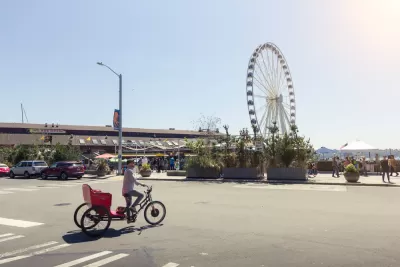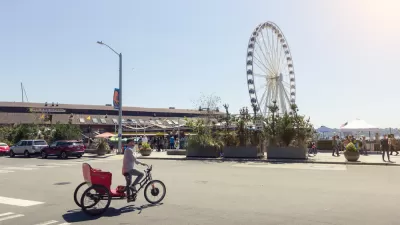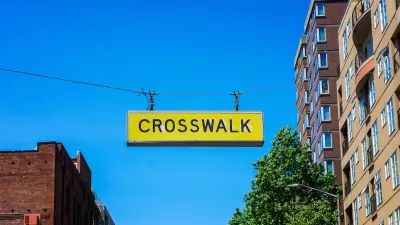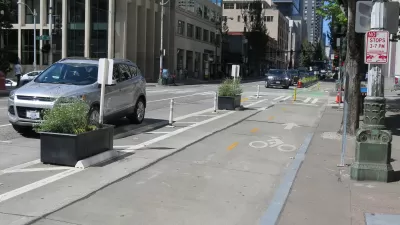After initial projects funded by the 2015 Move Seattle levy came in well over budget, the city of Seattle will now have extra pressure to choose impactful projects while reducing the scope of its Bicycle Master Plan.

"The Seattle Department of Transportation (SDOT) only plans to construct about half of the miles of protected bike lanes (PBLs) that it promised when voters approved a $930 million transportation levy in 2015, according to the Bicycle Master Plan implementation schedule released [earlier this month]," reports Ryan Packer.
"According to the plan, the department will completely stop constructing PBLs after 2021, when it has spent all of the Move Seattle Levy funds that were allocated toward them, and almost completely stop building neighborhood greenways after 2022."
The plan released earlier this month is the first time the city has reset its bike lane construction scheduled since 2017—the process resulted in toning down the optimism of the previous bike plans promised to voters.
"Costs for almost all programs are coming in over estimates, as the updated workplan for every other program that was released last November outlined, but the bicycle subprogram also ended up paying for expensive street rebuilds that were required for its centerpiece projects, adding drainage and utility costs to these bike projects," explains Packer.
The article also includes a lot about what projects remain in the plan and the new pressure to prioritize projects given the Bicycle Master Plan's much more limited scope.
FULL STORY: The Bicycle Master Plan May Soon Sputter to a Dead Stop

Planetizen Federal Action Tracker
A weekly monitor of how Trump’s orders and actions are impacting planners and planning in America.

Chicago’s Ghost Rails
Just beneath the surface of the modern city lie the remnants of its expansive early 20th-century streetcar system.

San Antonio and Austin are Fusing Into one Massive Megaregion
The region spanning the two central Texas cities is growing fast, posing challenges for local infrastructure and water supplies.

Since Zion's Shuttles Went Electric “The Smog is Gone”
Visitors to Zion National Park can enjoy the canyon via the nation’s first fully electric park shuttle system.

Trump Distributing DOT Safety Funds at 1/10 Rate of Biden
Funds for Safe Streets and other transportation safety and equity programs are being held up by administrative reviews and conflicts with the Trump administration’s priorities.

German Cities Subsidize Taxis for Women Amid Wave of Violence
Free or low-cost taxi rides can help women navigate cities more safely, but critics say the programs don't address the root causes of violence against women.
Urban Design for Planners 1: Software Tools
This six-course series explores essential urban design concepts using open source software and equips planners with the tools they need to participate fully in the urban design process.
Planning for Universal Design
Learn the tools for implementing Universal Design in planning regulations.
planning NEXT
Appalachian Highlands Housing Partners
Mpact (founded as Rail~Volution)
City of Camden Redevelopment Agency
City of Astoria
City of Portland
City of Laramie





























